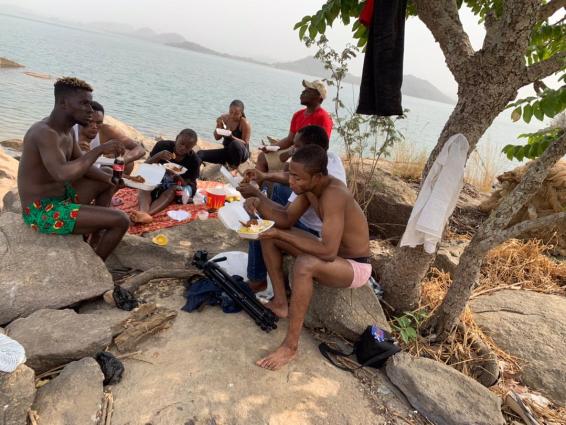Usuma Dam, Abuja: The myth, and every other thing!
It is a go-to destination for fun enthusiasts in the capital city.
By Amadin Ogbewe
“Once upon a time, outsiders had asked a fisherman for the name of the community where the dam is located and he’d given them his name instead, as he didn’t understand them. That is how the dam came to be called Usman Dam…after the fisherman”
A smile split my face at the guard’s little story. True or not, this was what I’d expected and hoped to find – the folklore that accompanies the serene and urban expanse of the large body of water confined by huge rock formations and structural engineering.
Usman Dam, also called Usuma Dam, is located in the Ushafa community of the Bwari Area Council in the Federal Capital Territory, Abuja.

A couple of friends and I stocked up on food and snacks before embarking on the journey. The first sight of the water and the rolling hills slows the beating of my heart as I hold my breath subconsciously. The rich green of the grass, dark blue waters, and the grey rocks are straight out of a painting… God, the artist.
The region is divided into the higher dam and the lower or shadow dam, where fishermen can be found with traps and canoes – catching fish for consumption or sale. Tourists are also allowed canoe rides around the large body of water for a small fee.
Half of my group (the ones not particularly scared of the watery depths) take a boat ride across the waters. The ride is calming and therapeutic. Though I do not see fish, I catch glimpses of little swimming creatures that look like tadpoles. There are also little islands dotted across the place, one of which is where we have our picnic while listening to tales of Usman Dam by Onay, our zestful tour guide, who’s also a staff of the FCT Water board.

Usman dam gets its water from two rivers from Kaduna and Nassarawa states, and also Gurara dam during the Dry Season.
Onay tells us that crocodiles can be found around the body of water, but are extremely shy and scared of humans, hence rarely appearing. I’m a bit sad that the crocodiles aren’t keen on being hospitable hosts! Usuma Dam is also the source of most of the capital city’s potable water. The natural water is first taken to a processing plant before it is transferred to the residents of Abuja for consumption and use. Onay also tells us about the spirit of the water. Though not quite in the same way, I do feel spiritually connected to the earth here. Perhaps, it’s the tangible silence and gentle breeze. It’s a great place for hikes, picnics, camping, and sightseeing.
Onay also regaled us with tales of Usuma Dam when the water levels are high, causing it to go through a turning point to avoid flooding the environs. At the time of our visit, the waters were rather tame. I reckon I’ll be visiting the dam again to witness the sight of unstoppable liquid force.
The experience was quite a thing to remember, and so we decided to end with a hike after our canoe rides, picnic and shallow swimming.

The views I’d witnessed so far were dwarfed when I looked down from the high hills. It was a different perspective that let me see more of the structures of the dam and the sprawling settlement adjacent to the dam. I was twice breathless: once from the enthralling sight and another from trying to draw in oxygen due to the steep and enjoyable climb.
Usman dam is a place that’s best suited for groups of people but there’s also an allure for those who simply wish to find themselves or reconnect to nature. When you’re floating in that water with naught but the sound of the paddle moving through the waves, gentle rustle of leaves, and chirping birds, you realise what really matters to you. You find reason and conviction.
To get to the dam, one can simply get to Dutse junction in Abuja through regular cabs. Once at the junction, a tricycle can convey you to the entrance in Ushafa for about ₦1,500.
Hotels close by including De Paradise Hotel Plot, which is at D138, Ushafa Extension Abuja, Bwari. Its features include a garden view, a balcony, and a private pool, among others. It’s about as affordable as Adex Gardens, which is even closer to the dam. A bar and lounge area are available for guests to chill and watch football matches or see other programmes while lounging. It offers a point-and-kill service for delicious catfish. A room goes for about ₦8,000.
Amadin Ogbewe is a writer and journalist based in Abuja.

Ayodelé is a Lagos-based journalist and the Content and Editorial Coordinator at Meiza. All around the megacity, I am steering diverse lifestyle magazine audiences with ingenious hacks and insights that spur fast, informed decisions in their busy lives.





